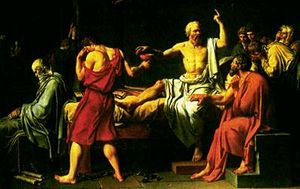Greek Philosophy

Greek Philosophy. It was Pythagoras (ca. 582 - 504 BC) who gave Philosophy its name, "the love of wisdom". Presocratic Philosophers were the first Greek philosophers of the Western tradition. Their most well-known successors were Socrates, who became the first notable teacher in the Academy; his pupil Plato, who believed reason was the key to knowledge; and Aristotle, who believed that experience was the best way to gain knowledge. Aristotle eventually founded the Lyceum.
After this philosophical golden age other systems appeared, like Cynicism, Stoicism, Epicureanism and Skepticism.
- Greek philosophers were among the first in the West to explore nature in a rational way and to make educated guesses about the creation of the world and the universe. This is why Greece is often referred to as the birthplace of Western culture. [1]
At the closing period of Greek philosophy Neoplatonism was founded by Plotinus of Lycopolis; its emphasis is a scientific philosophy of religion, in which the doctrine of Plato is fused with the most important elements in the Aristotelian and Stoic systems. [2]
Western culture is the heir of the Greek Philosophy that came to our society through the ideals and works of the Hellenistic philosophers, the medieval Muslim philosophers, the European Renaissance and the Enlightenment.
Theophrastos (371 â c. 287 BC) was the first to writer about the Greek philosophy.
Fragments
The gods have not revealed all things to men from the beginning, but by seeking they find in time what is better. Xenophanes.
My view is, to sum it all up, that all things are differentiations of the same thing, and are the same thing. And this is obvious; for, if the things which are now in this world--earth, and water, and air and fire, and the other things which we see existing in this world--if any one of these things, I say, were different from any other, different, that is, by having a substance peculiar to itself; and if it were not the same thing that is often changed and differentiated, then things could not in any way mix with one another, nor could they do one another good or harm. Neither could a plant grow out of the earth, nor any animal nor anything else come into being unless things were composed in such a way as to be the same. But all these things arise from the same thing; they are differentiated and take different forms at different times, and return again to the same thing. Diogenes.
As for me, all I know is that I know nothing. Socrates.
All the gold which is under or upon the earth is not enough to give in exchange for virtue. Plato.
Democracy arises out of the notion that those who are equal in any respect are equal in all respects; because men are equally free, they claim to be absolutely equal. Aristotle.
See also
